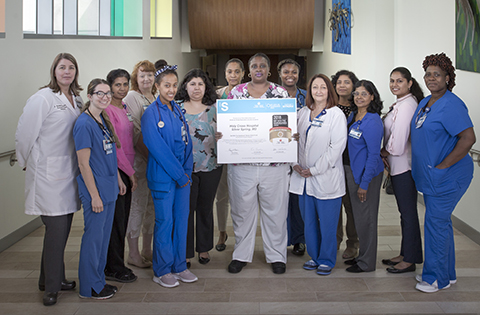
Holy Cross Hospital in Silver Spring, Md., has been recertified by The Joint Commission as an Advanced Primary Stroke Center that consistently meets the Commission's high standards and requirements for stroke care.
The hospital has also earned the American Heart Association/American Stroke Association Get with the Guidelines® – Stroke Gold Plus Achievement Award for the eighth year in a row, along with the association's Target: Stroke Honor Roll Elite Plus Award.
The 2018 awards highlight Holy Cross Hospital's commitment to ensuring stroke patients receive the most appropriate treatment according to nationally recognized, research-based guidelines and best practices.
"Holy Cross Hospital is honored to once again be recognized for excellent, life-saving stroke care," said Holy Cross Hospital President Louis Damiano, MD. "High-quality care is our number one priority, and our stroke team is committed to the consistent delivery of advanced stroke treatments to move life ahead for our patients."
Holy Cross Health is recognized for the exceptional delivery of stroke care at both of its hospitals. Earlier in 2018, Holy Cross Germantown Hospital received Primary Stroke Center designation from the Maryland Institute for Emergency Medical Service Systems (MIEMSS) and received the American Heart Association/American Stroke Association's Gold Plus Achievement Award, with Target: Honor Roll.
With two award-winning, designated primary stroke centers in the community, Holy Cross Health is committed to providing rapid, high-quality care for patients with a complex stroke condition. The specially trained stroke teams at Holy Cross Hospital and Holy Cross Germantown Hospital are available around the clock to quickly and expertly work through stroke protocols that improve outcomes for stroke patients.
As needed, stroke patients may receive inpatient services including speech, occupational and physical therapy before continuing recovery at home or at an acute care rehabilitation facility. Patients can also benefit from Holy Cross Health's comprehensive Neuroscience Program, including preventive medicine, community health services, support groups, rehabilitation, education and coordinated follow-up care.
"Our greatest reward is caring for our patients and helping them achieve the best possible outcome after a stroke," said Dr. Shahid Rafiq, medical director, Neurology and Stroke, Holy Cross Health. "The stroke teams at Holy Cross Hospital and Holy Cross Germantown Hospital are highly trained and dedicated to putting proven knowledge and guidelines to work on a daily basis for the benefit of patients affected by stroke in our communities."
Stroke is the 5th leading cause of death and a leading cause of adult disability in the United States, according to the American Heart Association/American Stroke Association. On average, someone in the U.S. suffers a stroke every 40 seconds and nearly 795,000 people suffer a new or recurrent stroke each year.
Learn more about the Holy Cross Health's Primary Stroke Centers and comprehensive Neuroscience Program.
**********************
Recognizing the Signs of a Stroke
The best way to remember common stroke warning signs and the need to seek emergency medical care is to think of the acronym “BEFAST.” BEFAST* stands for:
B = BALANCE: Has the person suddenly lost balance or coordination?
E = EYES: Has the person suddenly experienced changes in vision?
F = FACE: Does the person’s face look uneven, or does one side droop?
A = ARMS: Has one arm gone weak or numb?
S = SPEECH: Does the person’s speech sound slurred or strange?
T = TIME: If you observe any of these signs, it’s time to call 9-1-1 or get to the nearest stroke center or hospital emergency room for rapid diagnosis and treatment.
Other signs of stroke include numbness on one side of the body, trouble seeing with both eyes, trouble walking, and sudden onset of a severe headache.
*BEFAST was developed by Intermountain Healthcare, as an adaptation of the FAST model implemented by the American Stroke Association. Reproduced with permission from Intermountain Healthcare. Copyright 2011, Intermountain Health Care.
